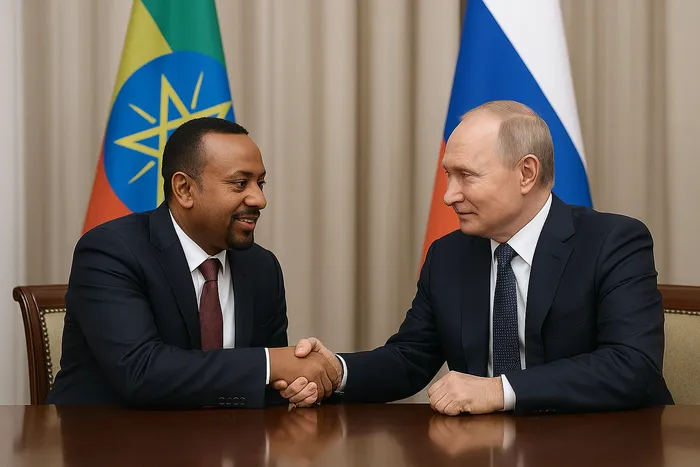
A videoconference took place on August 19, 2025, between Maksim Reshetnikov, the Russian Minister of Economic Development, and Kassahun Gofe Balami, the Ethiopian Minister of Trade and Regional Integration.
Image: //
A videoconference took place on August 19, 2025, between Maksim Reshetnikov, the Russian Minister of Economic Development, and Kassahun Gofe Balami, the Ethiopian Minister of Trade and Regional Integration. The purpose of this meeting was to discuss methods for strengthening economic cooperation between Russia and Ethiopia. This information was reported on the official website of the Russian Ministry of Economic Development.
Bilateral trade between Russia and Ethiopia experienced a remarkable surge in the first half of 2025, reaching US $191.2 million. This figure represents a 2.2-fold increase compared to the same period in 2024, when trade stood at approximately US $86.9 million. The rapid acceleration in trade volumes, as confirmed by Reshetnikov and multiple independent sources, is particularly notable given the historically modest trade between these two nations.
Ethiopia's coffee exports to Russia have been the primary driver of a significant increase in trade between the two countries. This growth is largely due to Russia's rising demand for Ethiopian coffee, a high-value agricultural product in which Ethiopia excels. This partnership represents a promising alignment between Ethiopia's comparative advantage in coffee production and Russia's import requirements.
Ministers focused on follow-up actions, particularly the upcoming intergovernmental commission meeting in November 2025. This meeting aims to broaden economic and scientific-technical cooperation. To prepare, Reshetnikov suggested online conferences to facilitate information exchange on in-demand goods and services. This preparatory work is crucial for fostering trade and business contacts, bridging short-term gains with long-term institutionalised cooperation.
Reshetnikov underscored Russia's readiness to supply various essential products, specifically grain, fertilisers, and agricultural machinery. These exports are both tangible and highly beneficial. Grain offers a solution for Ethiopia's food security challenges, particularly amidst climate impacts and increasing domestic demand. Fertilisers are crucial for enhancing crop yields and agricultural output, while machinery promotes mechanisation and long-term farming efficiency. This diverse offering of agricultural and industrial goods indicates a strategy to foster comprehensive interdependence, moving beyond reliance on single-commodity trade.
Reshetnikov extended a personal and diplomatic invitation to Minister Balami to visit Russia. This invitation serves to build trust, facilitate direct visits to Russian agribusiness firms, and establish long-term cooperative frameworks, underscoring the importance of personal engagement in advancing bilateral partnerships.
The substantial 2.2-fold increase in Russia-Ethiopia relations within a mere six months signifies exceptional and intentional policy decisions, rather than mere chance. Both nations are signaling a strategic commitment to structured partnerships, moving beyond sporadic trade. This is evident through Russia's focus on high-value Ethiopian exports like coffee, and its comprehensive provision of goods such as grain, fertilisers, and machinery.
Access to Russian markets allows Ethiopia to diversify its coffee exports beyond the EU and US. Upcoming online conferences could also introduce Ethiopian firms to new sectors and buyers, helping them build networks in niche markets. For Russia, Ethiopia offers agricultural imports that diversify its trade profile, while Russian exports of fertilisers, grain, and machinery can establish a presence in a market with growing demand for agricultural inputs.
Beyond trade, the November intergovernmental commission offers potential avenues for scientific and technical collaboration. This could encompass agritech development, the creation of drought-resilient farming methods, or joint research aimed at enhancing agricultural productivity. Although the videoconference primarily focused on trade, the commission's extensive mandate indicates a desire for multisectoral cooperation. Successful collaboration would not only foster bilateral economic growth but also contribute to broader regional development, given Ethiopia's strategic position as a gateway to East Africa.
Ethiopia and Russia are currently experiencing a period of significant opportunity, marked by a sharp increase in trade, particularly driven by Ethiopian coffee exports and Russia's strong supply capabilities in agriculture and machinery. This, coupled with growing momentum in intergovernmental collaboration, lays a promising groundwork for the future. Should the upcoming November commission result in concrete agreements, this sudden surge in trade could be channeled into a lasting economic partnership. The focus, practicality, and sectoral nature of this cooperation are highly telling. Through continued good-faith engagement, online dialogues, and in-person visits, both nations have the potential to transform a short-term trade spike into long-term, structured growth in their economic ties.
All data and figures are sourced from highly credible origins, including the official Russian Ministry of Economic Development and respected media outlets like Sputnik Africa and TV BRICS.
Written By:
*Dr Iqbal Survé
Past chairman of the BRICS Business Council and co-chairman of the BRICS Media Forum and the BRNN
*Sesona Mdlokovana
Associate at BRICS+ Consulting Group
African Specialist
** MORE ARTICLES ON OUR WEBSITE https://bricscg.com/
** Follow https://x.com/brics_daily on X/Twitter for daily BRICS+ updates
Related Topics: